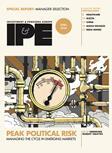Public private partnerships (PPP) are the “most credible and recognisable” means of attracting capital to infrastructure projects, according to the UK’s Royal Institute of Chartered Surveyors (RICS).
A report commissioned by the group also recommended the “bundling” of PPP projects to attract pension fund interest, as this had proven an effective approach in attracting Canadian pension investors to projects.
The paper, which examined the infrastructure markets in the US, Canada, Australia, India and the UK, noted that it was key to expand the PPP investor base in the wake of the financial crisis, which saw banks retreat from project finance, but that certain changes needed to be implemented to make the asset class more attractive.
“Firstly, there is a pertinent need to improve the transparency of infrastructure markets in order to facilitate performance benchmarking relative to other asset classes,” it said, citing the work of specialist journals and Prequin as allowing for “significant strides” in the area.
“Whilst it is clear there is a strong appetite for infrastructure investment within the institutional investment community, there is a requirement for more effective liability matching, including better alignment of investor profiles relative to project investment opportunities in order to expedite investment flow.”
RICS also called for greater collaboration between existing providers to bring about new and “innovative” funding models, especially in light of the impact of the European Commission’s Solvency II Directive for insurers.
The report also examined the success enjoyed in Canada in attracting pension funds to the market.
“It was noteworthy that many of the infrastructure investors consulted in the confines of this research advocated the ‘bundling’ of PPP projects in order to entice their appeal to ‘larger’ pension funds,” the report said.
“Many of the Canadian pension funds were actively pursuing investment opportunity, but ‘single project’ deals rarely conformed with investment mandates.”
Clare Eriksson, director of global research and policy at RICS, said it was “vital” that investment in UK infrastructure increased to allow for the country’s competitiveness to grow.
She added: “This research supports PPP as a viable solution to the UK’s current infrastructure investment deficit, and we at RICS call for the government to raise awareness of the opportunities infrastructure presents as an asset class.”


















No comments yet